(完整版)if条件状语从句_语法
If引导的条件状语从句

If引导的条件状语从句一、If引导的条件状语从句的结构If+主语+谓语+其它,主语+谓语+其它.=主语+谓语+其它+if+主语+谓语+其它.注:①有if 的是从句,另一个是主句② if 从句在前有逗号,if从句在后无逗号eg.If he runs, he will arrive there in time .=He will arrive there in time if he runs .如果他跑,她将会准时到达.二、if条件句主句和从句的时态,if译为如果1.主句用一般将来时(will+ V-原),if 从句用一般现在时(be用is/am /are ,实义动词用V-原/V-三单), 即主将从现注:①当主语为I ,you, we, they ,复数名词,以及由and连接的两个并列成分等时,实义动词用V-原②当主语为he ,she ,it ,that ,单个人名,单数名词等时,用V-三单)eg .If it is (be) rainy , we will stay(stay) at home .If she studies (study ) hard , she will get (get) good grades .2.若主句中含有情态动词(can/may/ must/may/might/should )时,主句为情态动词+ V-原,if从句用一般现在时eg .We can will go(go) out if it stops (stop ) raining .eg.If you want (want) to get good grades ,you should study (study)hard.3.若主句为肯定祈使句或否定祈使句时,if从句用一般现在时注:以V-原开头的句子是肯定祈使句,否定祈使句在V-原前加Don’teg. Eat (eat) them if you are (be) hungry .eg. Don’t go (not go)to play football if she doesn’t finish (not finish)your homework .拓展:if 还可引导宾语从句,译为“是否”If 引导宾语从句时,时态需根据语境确定,如果主句是一般现在时,从句可以根据具体情况选用时态,如果主句是一般过去时,从句必须跟过去时相关( )1.----Mike wants to know if _________ a picnic tomorrow .----- Yes . But if it _________ , We will visit the museum .A. will you have , will rainB. you will have , will rainC. you will have ,rainsD. will you have , rain( )2.We are not sure if it ____ tomorrow .If it ____ , our sports meeting will be put off .A. will rain , rainsB. rains , will rainC. will rain ; will rain ( )3. ---Can you guess if Mike _______ swimming this afternoon ?---I think he will go with us if he _______ fine .A. will go ,isB. will go ,will beC. goes , isD. goes ,will be答案解析:1.迈克想知道是否你们明天将去野营,if译为是否,引导宾语从句,时态根据语境而定,句末有tomorrow , 所以要用将来时。
知识点名:if引导的条件状语从句

知识点名:if引导的条件状语从句讲义:if引导的条件状语从句1. if意为“如果”,引导条件状语从句时,既可放在主句前面,也可放在主句后面。
若if条件句放在句首,从句后面常加逗号与主句隔开。
If you go there, I'll go, too.如果你去那儿,我也会去。
My mother will take me to the park if she is free.如果我妈妈有空,她就会带我去公园。
2. 时态运用:在含有if引导的条件状语从句的主从复合句中,主句为下列情形之一的,条件状语从句通常用一般现在时。
(1) 主句是一般将来时,即遵循“主将从现”的原则。
If he comes, he will bring his violin.如果他来,他就会把他的小提琴带来。
(2) 主句是含有情态动词may/might/can/must/should等的句子。
If you want to lose weight, you must eat less bread.如果你想减肥,你必须少吃面包。
(3) 主句是祈使句。
If you are not strong enough, please don't take part in such an activity.如果你不是很健壮,请不要参加这种活动。
3. 句型转换:(1) 借助“祈使句+and/or+陈述句(一般将来时)”这一句型来转换。
其中,在句意上and表示顺承;or表示转折,意为“否则”。
If you work hard, you'll pass the exam easily.=Work hard, and you'll pass the exam easily.努力学习,你将很容易通过考试。
Work hard, or you won't pass the exam easily.努力学习,否则你不会轻易地通过考试。
高三复习-if引导的条件状语从句用法

if引导的条件状语从句用法if引导的状语从句,通常我们可以叫条件状语从句,注意一下它的时态非常自然的一种结构,然后我们读熟一个例句就好了。
If it rains tomorrow,I will not go。
If是一个连词,作为连词后面常常会引导一个句子,这个句子就是状语从句。
例句If it rains tomorrow,I will not go,如果明天下雨我就不会去。
这个条件状语从句叫做主将从现,主语用将来时,从句用一般现在时。
注意:在if的条件状语从句中,主句为下列情形之一时,if条件状语要用一般现在时。
1.主句是一般将来时(主将从现)例如:If he comes, he will tell me all.如果他来了,他会告诉我所有(的事情)。
(这个知识点在初中阶段是常考题,简称“主将从现”——主句是一般将来时态,从句是一般现在时态。
本句中主句是由will引导的一般将来时态的句子,从句是由if引导的一般现在时态的句子,符合主将从现的法则。
)2.主句是含有情态动词may/might/can/must/should等句子。
例如:If you want to lose weight, you must eat less bread.如果你想减肥,你必须少吃面包。
(主句中含有情态动词must,所以if引导的条件状语从句要用一般现在时态。
)3.主句是祈使句例如:If you are not strong enough, please dont take part in such an activity.如果你不够强壮,请不要参加这种活动。
(主句是一个Do型的祈使句,所以根据原则,if从句要用一般现在时态。
)。
if引导的条件状语从句总结(精)
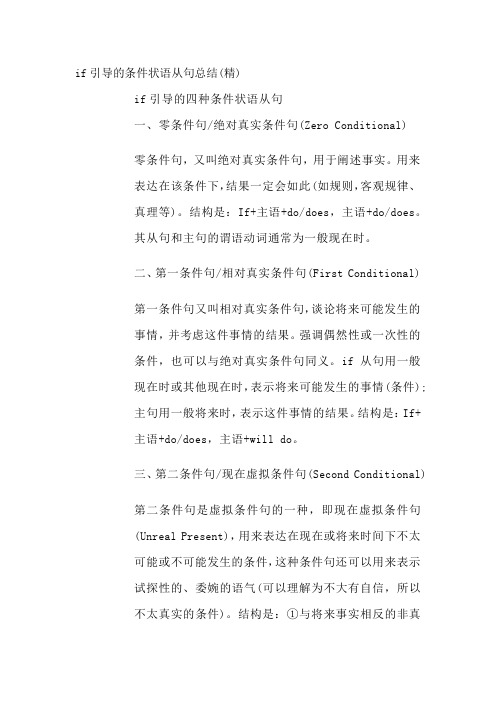
if引导的条件状语从句总结(精)if引导的四种条件状语从句一、零条件句/绝对真实条件句(Zero Conditional)零条件句,又叫绝对真实条件句,用于阐述事实。
用来表达在该条件下,结果一定会如此(如规则,客观规律、真理等)。
结构是:If+主语+do/does,主语+do/does。
其从句和主句的谓语动词通常为一般现在时。
二、第一条件句/相对真实条件句(First Conditional)第一条件句又叫相对真实条件句,谈论将来可能发生的事情,并考虑这件事情的结果。
强调偶然性或一次性的条件,也可以与绝对真实条件句同义。
if从句用一般现在时或其他现在时,表示将来可能发生的事情(条件);主句用一般将来时,表示这件事情的结果。
结构是:If+主语+do/does,主语+will do。
三、第二条件句/现在虚拟条件句(Second Conditional)第二条件句是虚拟条件句的一种,即现在虚拟条件句(Unreal Present),用来表达在现在或将来时间下不太可能或不可能发生的条件,这种条件句还可以用来表示试探性的、委婉的语气(可以理解为不大有自信,所以不太真实的条件)。
结构是:①与将来事实相反的非真实条件句是If+主语+should do/were to do/did,主语+would/should/could/might do;②与现在事实相反的非真实条件句是If+主语+did,主语+would/should/could/might+do。
四、第三条件句/过去虚拟条件句(Third Conditional) 第三条件句是表示与过去事实相反的虚拟语气,是用来表达如果(If)当时那样发生,另外一方面(当时)结果会如何。
通常是指过去的事情,带有一切已经太迟而不能够补救的意思。
结构是:If+主语+had done,主语+would/should/could/ might+have done。
if 条件句的时态搭配1.if从句用一般现在时,主句用一般将来时2.if从句用一般现在时,主句用may/might/canIf the fog gets thicker the plane may/might be diverted.3.if从句用一般现在时,主句用must/shouldIf you want to lose weight you must/should eat less bread.4.if从句用一般现在时,主句用一般现在时5.if从句用现在进行时,主句用一般将来时6.if从句用现在完成时,主句用一般将来时If you have finished dinner I’ll ask the waiter for the bill.。
if 引导条件状语从句

if 引导条件状语从句
摘要:
1.条件状语从句的定义
2.if 引导条件状语从句的语法结构
3.if 引导条件状语从句的用法和实例
正文:
条件状语从句是用来表示一个条件,即如果某个条件成立,那么就会发生某个结果。
在英语中,条件状语从句通常由if 引导。
语法结构:
if + 条件从句(主语+ 谓语+ 其他成分)
主句(主语+ 谓语+ 其他成分)
if 引导条件状语从句的用法和实例:
1.肯定句中的条件状语从句
If it is hot, we will go to the beach.(如果天气热,我们将去海滩。
)
2.否定句中的条件状语从句
If it is not hot, we will go to the park.(如果天气不热,我们将去公园。
)
3.一般疑问句中的条件状语从句
Will you help me if I need your help?(如果我需要你的帮助,你会帮助我吗?)
4.特殊疑问句中的条件状语从句
What will you do if you win the lottery?(如果你中彩票,你会做什么?)
通过以上实例,我们可以看到if 引导条件状语从句在各种句子类型中的用法。
If引导的条件状语从句
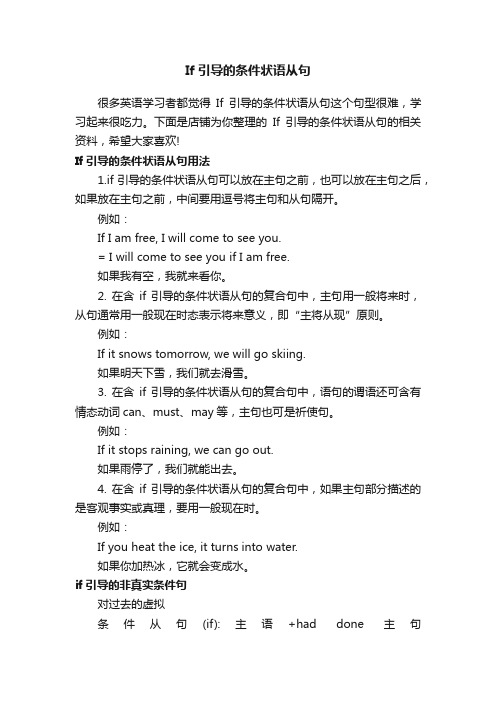
If引导的条件状语从句很多英语学习者都觉得If引导的条件状语从句这个句型很难,学习起来很吃力。
下面是店铺为你整理的If引导的条件状语从句的相关资料,希望大家喜欢!If引导的条件状语从句用法1.if引导的条件状语从句可以放在主句之前,也可以放在主句之后,如果放在主句之前,中间要用逗号将主句和从句隔开。
例如:If I am free, I will come to see you.= I will come to see you if I am free.如果我有空,我就来看你。
2. 在含if引导的条件状语从句的复合句中,主句用一般将来时,从句通常用一般现在时态表示将来意义,即“主将从现”原则。
例如:If it snows tomorrow, we will go skiing.如果明天下雪,我们就去滑雪。
3. 在含if引导的条件状语从句的复合句中,语句的谓语还可含有情态动词can、must、may等,主句也可是祈使句。
例如:If it stops raining, we can go out.如果雨停了,我们就能出去。
4. 在含if引导的条件状语从句的复合句中,如果主句部分描述的是客观事实或真理,要用一般现在时。
例如:If you heat the ice, it turns into water.如果你加热冰,它就会变成水。
if引导的非真实条件句对过去的虚拟条件从句(if):主语+had done 主句might/would/should/could+have done对现在的虚拟if+ 主语+动词过去式(be用were)主句might/would/should/could+do对将来的虚拟if+主语+动词过去式(be用were)或主语+should do或主语+were to do主句 might/would/should/could+doe.g.Tom got to the station in time because he started earlier.If Tom had started late, he would have missed the train.Do you think the thief entered through the door?No, if he had, I don't believe, he would have broken the living room window.If the book weren't so expensive, I would buy it.If you didn't live so far away, we would be able to visit you more.What would you do if you lost your passport in a foreign country?Why hasn't he come? If he should not come on time, we would have to put off the trip.2.注意事项e.g.If she hadn't work hard at English in the past, she wouldn't work as well as a secretary in a large company now. 混合时间的虚拟语气从句为对过去的虚拟,主句是现在。
If引导的条件状语从句的用法

If引导的条件状语从句的用法“If”的具体用法一. “If”引导的宾语从句的用法Step1:从句具备的两个条件:(1)有引导词.(2)引导词后面有完整的句子.Step2:宾语从句的含义:宾语从句在复合句中作主句的(及物动词或介词)的宾语. Step3: 句型结构:主语+及物动词(v t)+引导词+主语+谓语(+其它)主句宾语从句主句谓语动词引导词宾语从句译文:永远不要谴责你不了解的事情.操练句子的八大步骤:第1步:首先搞清每个单词的含义和词性.第2步:语法现象分析.分清句子主要结构和成分. 按照主要句子对应成分进行朗读1遍. 第3步:意群划分.按照意群朗读至少3遍.第4步:单词读准.一定确保把句子当中的每个单词读标准和地道,这是学习英语的重中之重,一定不可忽略,为整体句子朗读做好准备和铺垫.每个单词至少朗读3遍.第5步:按照意群朗读细则:首先听原声录音,一个一个句子读顺,先慢速朗读3遍,然后中速3遍,最后快速3遍,把句子操练熟练后,利用李阳疯狂英语核心理论方法,“三最口腔训练法”和“一口气训练法”.第6步:中英翻译互换训练练习.细则:组织学员进行两两中英互换练习.一个说中文,一个说英文,然后再互换角色. 第7步:复述练习.细则:找两位学员进行现场复述训练和现场翻译训练第8步:默写练习.Step4:“if”引导宾语从句的特点:(1)“if” 有含义,表示“是否”.(2)不可省略. E g: 主语状语谓语引导词宾语从句译文:我只是想知道今晚她是否来参加我的生日宴会.Step5: “If”引导的宾语从句的用法与“whether” 引导的宾语从句的用法的两点区别.(1)若句末没有出现“or not”, 两者可以互换(.2)若句末出现“or not”, 只能用“whether”. E g: (两者皆可)主句引导词宾语从句比较:I don’t know whether my parents can come to the class meeting or not.(只能用“whether”)二. “if”引导真实条件状语从句的用法Step1: 条件状语从句具备4大语法意义(1):状语从句在句中起状语作用,修饰主句的整个句子.(2):状语从句通常有从属连词引导,与主句相接.(3):状语从句放在句首时,常用逗号与主句隔开;若放在句末,其前一般不用逗号.(4):条件状语从句分为从句和主句,引导词后面表示可能的句子为从句,而另外一个表示结果的句子为主句.Step2: “If” 引导真实条件状语从句的特点:(1)从句的谓语动词用一般现在时态.(2)主句的谓语动词用一般将来时态,或者用情态动词:“may/ might+动词原形.3大句式:第1大句式:If + simple present, subject +will/won’t +动词原形.引导词从句主句译文:有闲论是非,无暇爱他人.练习题:1, A: gained B: have gained C: will gain2, get married, you will have more free time.A: didn’t B: don’t C: doesn’t第2大句式:If + simple present, subject +may/might+动词原形.E g: 引导词从句主句Explain: We can also use may and might as consequences, to show that the consequence is less likely.译文:如果你拥有更多的空闲时间,你或许会感到无聊.第3大句式:If + simple present, subject +will+be able to+动词原形或will +have to+动词原形.E g: 引导词从句主句译文:如果你节省一些钱,你就能去旅游. 引导词从句主句译文:如果你去外国旅游,你得获得签证.Explain : We can not say will can or will must. Instead, we say“will be able to+动词原形” and “will have to+动词原形”.三. “if”引导非真实条件状语从句的用法,即虚拟语气.Step1: 虚拟语气的语法意义:“表示说的话不是事实,或者不可能发生,实现的可能性不是很大,只是一种愿望,假设或者猜想,从句和主句的谓语动词用一种特殊形式.(一)..表示对将来情况的一种假设.特点:A: 从句的谓语动词(1)一般过去时态(2)should+动词原形.(3)were to+动词原形. B: 主句的谓语动词用would/could/should/ might +动词原形.从句动词形式主句动词形式译文:如果明天下雨的话,我就待在家里.(二).表示对现在和目前情况的一种假设.特点:A: 从句的谓语动词用一般过去时态,“be”动词一律用“were”. B: 主句的谓语动词用would/could/should/ might /ought to+动词原形.从句动词形式主句动词形式译文:不经历风雨怎么见彩虹.几种特殊句式:第1特殊句式: If I were you, I would +动词原形. 假如我是你的话,我会-------- E g: If I were you, I would talk to my boss first译文:假如我是你的话,我会首先和我的老板谈谈.If I were you, I would change my current job.译文:假如我是你的话,我会换掉我目前的工作.第2特殊句式:What would you do if----------------------------? 假如-----------------你会怎么办? E g: What would you do if you were in my shoes?译文:假如你站在我的立场,你会怎么办?What would you do if you got fired?译文:假如你被炒鱿鱼,你会怎么办?第3特殊句式:What would happen if -----------? 假如/倘若------将会出现何种结果呢? E g: What would happen if we combined animal genes with human genes?译文:如果我们把动物的基因与人的基因交织组合在一起,将会出现什么样的结果呢?What would happen if we lost touch with each other?译文:倘若我们彼此都失去联系,将会变成什么样的结果呢?(三).表示对过去情况的一种假设.特点:A: 从句的谓语动词用过去完成时态即:“had+过去分词”. B: 主句的谓语动词用would/could/should/might/ought to +现在完成时态即“have +过去分词”.E g: If I 从句时态形式主句动词形式译文:要是我早知道你在北京的话,我会带你游览这座城市的. 从句时态形式主句动词形式译文:要是我当时多加小心的话,我会做的更加出色.练习题he had not hurt his leg, John would have won the race (2019全国)A: Since B: If C: Though D: Whenhere last Saturday, he 全国). A: had been; would have prevented B: had been; would preventC: Were; would prevent D: were; would have prevented3. If the workers hadn’t2019北京)A: would have failed B: had failed C: fail D: have failed.4. A: If he 全国)B: Luckily he was sent to the hospital immediately.A: was warned B: had been warned C: would be warned D: is warned(四)虚拟语气中“if”的省略倒装现象特点:省略从句中的“if”,只需把系动词或者助动词提到主语前即可,主句保持不变. 基本句式:“Should/ were/had +主语+部分谓语”.E g: If you were in my position , you would do the same.倒装现象:Were you in my position , you would do the same.E g: If I had been in a good mood then, I would have gone to the movies.倒装现象:Had I been in a good mood then, I would have gone to the movies.练习题:1, I in good health, I with you.(2019福建)A: Am; will go B: Were; would go C: was ; shall go D: were; were going2, for the doctor’s careful treatment, he till last year.(2019山东)A: If is not; can’t live B: Were it not; couldn’t liveC: Had it not been; couldn’t have lived D: If they were not; couldn’t live3. it rain tomorrow , we would have to put off the visit to the memorial.(2019安徽) A: Were B: Should C: Would D: Will4, A: Would you be B: Should you be C: Could you be D: Might you be.(五)“If”引导虚拟语气的错综时间.特点:(1)从句的时间与主句所表示的时间不一致.(2)从句和主句的动作不是发生在同一时间,具体动词形式要根据时间而定.两种特殊情况:(1)若从句表示的是过去,谓语动词用过去完成时态,即:“had +过去分词”,主句表示的是现在,谓语动词用could/would/should+动词原形. 表示的是过去表示的是现在译文:要是他当时吃药的话,他现在感觉更好一些.(2)若从句表示的是现在,谓语动词用一般过去时态;主句表示的是过去,谓语动词用情态动词加现在完成时态,即:“would/ could /should have +过去分词”. 表示的是现在表示的是过去译文:如果我知道他的电话号码的话,我就给他打电话了。
if引导的条件状语从句讲解
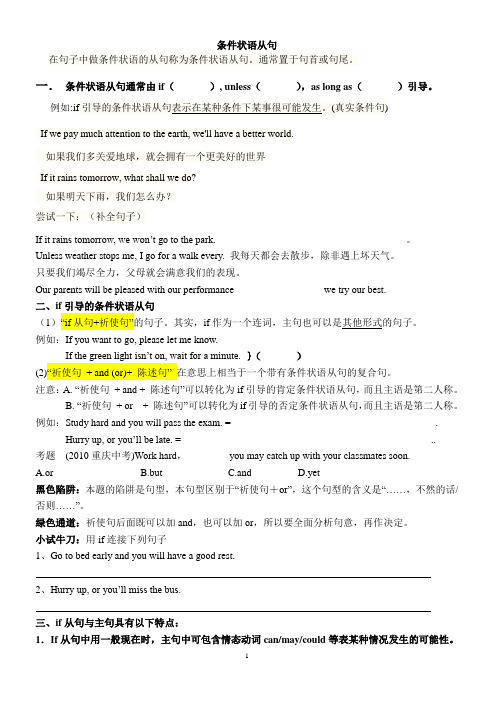
条件状语从句在句子中做条件状语的从句称为条件状语从句。
通常置于句首或句尾。
一.条件状语从句通常由if(), unless(),as long as()引导。
例如If we pay much attention to the earth, we'll have a better world.如果我们多关爱地球,就会拥有一个更美好的世界If it rains tomorrow, what shall we do?如果明天下雨,我们怎么办?尝试一下:(补全句子)If it rains tomorrow, we won’t go to the park.______________________________________。
Unless weather stops me, I go for a walk every. 我每天都会去散步,除非遇上坏天气。
只要我们竭尽全力,父母就会满意我们的表现。
Our parents will be pleased with our performance _____ _____ ______ we try our best.二、if引导的条件状语从句(1)“if从句+祈使句”的句子。
其实,if作为一个连词,主句也可以是其他形式的句子。
例如:If you want to go, please let me know.If the green light isn’t on, wait for a minute.}()(2)“祈使句+ and (or)+ 陈述句” 在意思上相当于一个带有条件状语从句的复合句。
注意:A. “祈使句+ and + 陈述句”可以转化为if引导的肯定条件状语从句,而且主语是第二人称。
B. “祈使句+ or + 陈述句”可以转化为if引导的否定条件状语从句,而且主语是第二人称。
例如:Study hard and you will pass the exam. =_________________________________________.Hurry up, or you’ll be late. =__________________________________________________..考题(2010重庆中考)Work hard,________ you may catch up with your classmates soon.A.orB.butC.andD.yet黑色陷阱:本题的陷阱是句型,本句型区别于“祈使句+or”,这个句型的含义是“……,不然的话/否则……”。
总结好的:if引导的条件状语从句

总结好的:if引导的条件状语从句if引导的条件状语从句if1) ⽤法:(1)条件状语从句通常由连词if引导,意为“如果、假如”,主句不能⽤be going to表⽰将来,⽽应该⽤shall,will。
If you leave now, you are never going to regret it. (错误)If you leave now, you will never regret it. (正确)(2)if “如果”,引导条件状语从句,主句⽤⼀般将来时,从句则⽤⼀般现在时,如:If it rains tomorrow, I shan’t climb the hills.(3)另外,主句是祈使句或含有情态动词,从句也⽤⼀般现在时。
如:Please call me if he comes next Sunday.Can you call the policeman if you are in the trouble.注意宾语从句中的if与条件状语从句if的区别。
宾语从句中的if“是否”相当于whether,引导宾语从句,时态需根据语境确定。
如果主句⽤⼀般现在时,从句可以根据具体情况选⽤时态,如果主句⽤⼀般过去时,从句必须⽤过去式的某种形式。
I don't know if it will rain tomorrow. 我不知道明天是否会下⾬。
Our teacher said there was going to be a football match the next month.我们说下⽉将有场⾜球⽐赛。
【边学边做】⽤括号内所给词的正确形式填空。
1. What will you buy if you ________(have)a lot of money?2. If it ________(not snow)tomorrow, we will feel unhappy.3. You mustn’t go to school if you ________(be)still in bed.4. If he _______(be)at home at that time, he would know it.5. Please show me the way if you ________(know)it.6. You will hurt your teeth if you ________(eat)too much candy.7. If you gave me a toy car, I _________(be)very happy.8. I would get the prize if I _________(work)hard.9.If she ______ (finish ) work early ,she ______(go) home.10.If the weather______(be)fine,we_______(go)for a walk .11. If I_____(have) time tonight ,I _______(finish) the book I’m reading.12. If it ______(rain) next weekend , we_______(not be able to ) plant the vegetable .13. If it_______(rain),we______(stay) at home .14.If she______(arrive) ,she _____(phone) me .15. If he_____(call),tell him I’ll ring back .⼆、⽤所给词的适当形式填空1. If you ________(feel) tired, you _________ (have) to have a rest.2. Where _____ he ____(see) the film if he _________(have) time?3. If there ____ (be) fewer trees, there _______ (be) more pollution.4. He ___ (dress) more casually if he ___ (not work) on weekends.5. If Marcia _______ (live) alone, she _______ (keep) a pet parrot.6. Lana _____ (buy) a new dress if the old one ____ (be) out of style.7. The twins _______ (fight) if they__________ (argue).8. I ______ (have) a bake sale if I ____ (need) money for education.9. Peter ____ (send) me a beautiful souvenir if he ____(tour) Spain.10. If Mr. Green _______ (say) I am hard- working, my parents ___ (feel) glad.11. I ______ (go) to the beach if it________ (not rain) this week.12. _____they ___ (have) a match if the P.E. teacher __ (be) busy?13. He ____ (write) a letter to his grandparents if he ____ (get) his report card this week.14. If she ______ (get) up late, she _____ (not catch) the early bus.15. Peter ____ (major) in English if he ____(pass) the exams in Peking University.⼆、完成句⼦1. 他如果看电视太久了,他的⽗母会不⾼兴。
If引导的条件状语从句

编辑课件
4
变换:
1.有if引导的条件状语从句的复合句中,当主句和从句的 主语均为you时,可转换为“祈使句,and+简单句”或
“祈使句,or+简单句”
You can pass the exam if you work hard. Work hard ----------------,and you will pass the exam.
for you , it will be good for your study.
编辑课件
12
5. If you __d_o_n_’_t _w_o_rk___(not work ) hard , you _w_o_n_’_t _p_as_s_(not pass) the exam.
6. If she __m__e_n_d_s_(mend) the computer , her father __w_o_n_’t_b_l_am__e_(not blame ).
W--i-t-h--y--o-u--r--h--e-l-p-, I’ll finish my job soon. 如果你帮我,我将很快完成我的工作。 If there is no water, fish may die.
Fish may die w--i-th--o--u-t--w--a--t-e-r--. 如果没有水,鱼可能会死。
I won’t go there unless I hear from you.(同义 if 句) don’t
I won’t go there _____ I _____hear from you. I won’t go to the party if I am not invited. (同义 句) unless I won’t go to the party_____ I am invited.
(完整版)if引导的条件状语从句-虚拟语气

虚拟语气是一项语法难点,为了让学员们便于理解与记忆,我们把虚拟语气分成三大块来讨论:1.名词从句中的虚拟语气标志词+should+动词原形2.条件从句中的虚拟语气①三种基本态②倒装虚拟句③混时虚拟句④含蓄虚拟句⑤跳层虚拟句3.其它情形中的虚拟语气(wish/would rather/It’s high time…/If only…/lest)一.三种基本形态(1)表虚拟的时间if从句谓语形式主句谓语形式现在:did / were would (should, might, could)+do过去:had done/ had been would (should/might/could)+have done(been)将来:were to/ should+do would (should, might, could)+do三种基本形态(2)(这是基础,建议牢记下面的例句,争取能脱口而出)与现在事实相反:If I had enough money, I would buy a book.与过去事实相反:If I had had enough money, I would have bought a book.与将来事实相反:If I were to have enough money, I would buy a book.If I should have enough money, I would buy a book.二、倒装虚拟句(只能与过去/将来事实相反,省去if,只有三种倒装形式)Had I had enough money, I would have bought a book.Were I to have enough money, I would buy a book.Should I have enough money, I would buy a book.三、混合时间虚拟语气(主要是抓住时间状语)(对过去事实虚拟+对现在事实虚拟)If I had studied English at school, I could read the English novel now.(对现在事实虚拟+对过去事实虚拟)If she were not so careless, she wouldn’t have made such a mistake.四、含蓄虚拟句(在四级考试中目前还未出现此考点,但在阅读中常见)3. 虚拟语气用在主语从句中。
If引导的条件状语从句

If引导的条件状语从句(用法)状语从句:用一个句子(从句)来作另一个句子(主句)的状语,用作状语的句子就叫作状语从句。
作什么样的状语就叫什么类型的状语从句。
例如:条件状语从句就是用一个句子来作条件状语。
状语从句的分类:(1)时间状语从句凡是从句都必须有引导词,引导时间状语从句的词有when,before,after,until,as soon as,while 等。
(2)条件状语从句主要看一下由if引导的条件状语从句。
if 意为“如果”,引导条件状语从句时,表示假如有从句的动作发生就(不)会有主句的动作发生。
例如:If it doesn't rain to morrow,we will go there by bike.如果明天不下雨,我们就骑自行车去那里。
If I g et there early,I can see the doctor quickly.如果我早早地到那里,我就可以快点看病。
3)地点状语从句用法要点常用where(哪里)和wherever(无论哪里)eg. Where t here is a will,there is a way. 有志者,事竟成。
We will go wherever the mothe rland need us most. 我们要到祖国最需要的地方去。
(4)原因状语从句用法要点常用的引导连词有because,as和since,三者的区别是:在回答问题的时候,使用becaus e;对于显而易见的原因,常用as或since;as和since的从句常放在主句之前,而beca use的从句常放在主句之后。
eg. Why did you go?I went because Tom told me to go. 你为何去?那是因为汤姆叫我去。
He was angry not because we were late but because we made a noise. 他很生气不是因为我们来迟了,而是因为我们弄出了声音。
if条件状语从句 -【完整版】
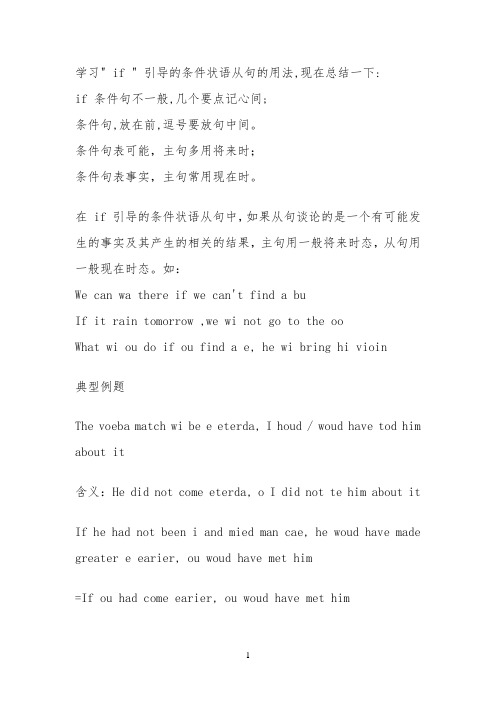
学习" if " 引导的条件状语从句的用法,现在总结一下:if 条件句不一般,几个要点记心间;条件句,放在前,逗号要放句中间。
条件句表可能,主句多用将来时;条件句表事实,主句常用现在时。
在 if 引导的条件状语从句中,如果从句谈论的是一个有可能发生的事实及其产生的相关的结果,主句用一般将来时态,从句用一般现在时态。
如:We can wa there if we can't find a buIf it rain tomorrow ,we wi not go to the ooWhat wi ou do if ou find a e, he wi bring hi vioin典型例题The voeba match wi be e eterda, I houd / woud have tod him about it含义:He did not come eterda, o I did not te him about itIf he had not been i and mied man cae, he woud have made greater e earier, ou woud have met him=If ou had come earier, ou woud have met himShoud it rain, the croe to our meeting tomorrow2)在宾语从句中的应用在表示命令、建议、要求等一类动词后面的从句中。
order, ugget, mand, init houd doI ugget that we houd hod a meeting net weeHe inited that he houd be ent there注意:如ugget, init不表示"建议" 或"坚持要某人做某事时",即它们用于其本意"暗示、表明"、"坚持认为"时,宾语从句用陈述语气。
If 条件状语从句归纳总结
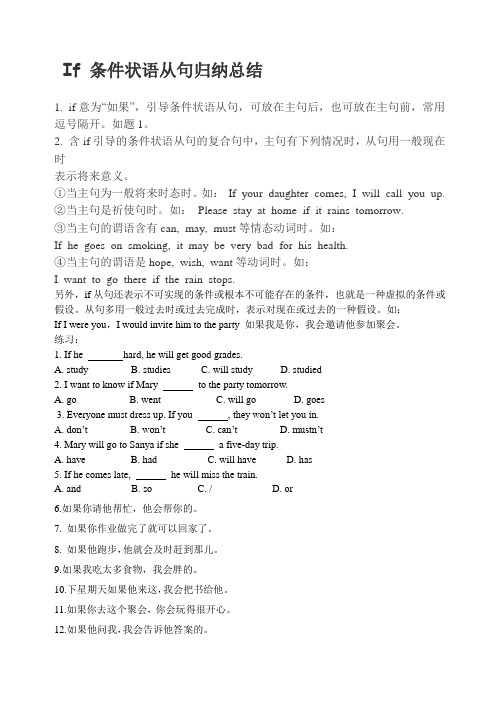
If 条件状语从句归纳总结1. if意为“如果”,引导条件状语从句,可放在主句后,也可放在主句前,常用逗号隔开。
如题1。
2. 含if引导的条件状语从句的复合句中,主句有下列情况时,从句用一般现在时表示将来意义。
①当主句为一般将来时态时。
如:If your daughter comes, I will call you up.②当主句是祈使句时。
如:Please stay at home if it rains tomorrow.③当主句的谓语含有can, may, must等情态动词时。
如:If he goes on smoking, it may be very bad for his health.④当主句的谓语是hope, wish, want等动词时。
如:I want to go there if the rain stops.另外,if从句还表示不可实现的条件或根本不可能存在的条件,也就是一种虚拟的条件或假设。
从句多用一般过去时或过去完成时,表示对现在或过去的一种假设。
如:If I were you,I would invite him to the party 如果我是你,我会邀请他参加聚会。
练习:1. If he hard, he will get good grades.A. studyB. studiesC. will studyD. studied2. I want to know if Mary to the party tomorrow.A. goB. wentC. will goD. goes3. Everyone must dress up. If you , they won’t let you in.A. don’tB. won’tC. can’tD. mustn’t4. Mary will go to Sanya if she a five-day trip.A. haveB. hadC. will haveD. has5. If he comes late, he will miss the train.A. andB. soC. /D. or6.如果你请他帮忙,他会帮你的。
初中英语If引导的条件状语从句

初中英语――if引导的条件状语从句在if 引导的条件状语从句中,if 和条件句位置灵活,可直接放在主句后面,若if 条件句放句首,从句后面要加逗号,和主句隔开。
还要注意前后时态一致原则.引导条件状语从句的连接词主要有:if(如果)、unless(除非)或as long as (只要)等。
unless在意思上等于if...not。
一、条件状语从句用法1、引导条件状语从句最常用的连词是if,由if引导的条件状语从句表示在某种条件下某事很可能发生。
如:If you ask him, he will help you.如果你请他帮忙,他会帮你的。
If you fail in the exam, you will let him down.如果你考试不及格,你会让他失望的。
另外,if从句还表示不可实现的条件或根本不可能存在的条件,也就是一种虚拟的条件或假设,从句多用一般过去时或过去完成时。
如:If I were you, I would invite him to the party.如果我是你,我会邀请他参加聚会。
2、unless = if...not.除非,若不,除非在……的时候例如:Let's go out for a walk unless you are too tired.=If you are not too tired, let's go out for a walk.Unless it rains, the game will be played.除非下雨,比赛将照常进行。
二、时态问题在条件状语从句中,要注意“主将从现”的规定,即主句用一般将来时,从句用一般现在时表示将来时。
例句:I will come to see you if I have time.我有时间,我就来看你。
三如果if 条件句谈论的是重复发生和预示要发生的情景和事件,则主从句大多用一般现在时态。
如:If bears are in danger ,they attack people.误区提醒if 既可以引导条件状语从句,表示“如果”,也可以引导宾语从句,表达“是否”。
初中英语If引导的条件状语从句
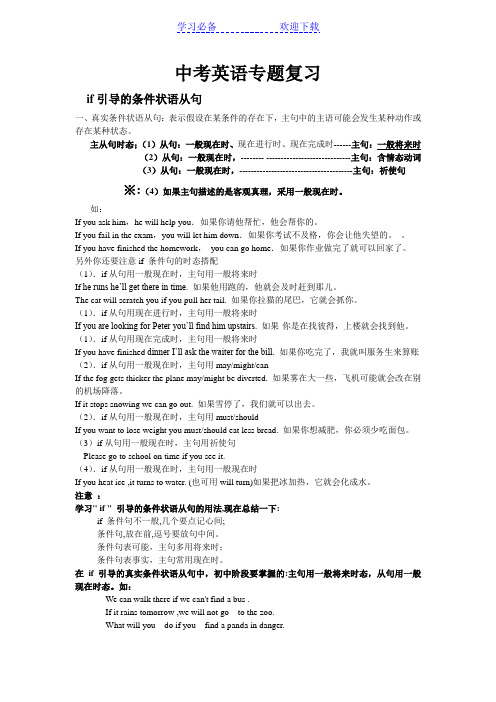
中考英语专题复习if引导的条件状语从句一、真实条件状语从句:表示假设在某条件的存在下,主句中的主语可能会发生某种动作或存在某种状态。
主从句时态;(1)从句:一般现在时、现在进行时、现在完成时------主句:一般将来时(2)从句:一般现在时,-------- -----------------------------主句:含情态动词(3)从句:一般现在时,---------------------------------------主句:祈使句※:(4)如果主句描述的是客观真理,采用一般现在时。
如:If you ask him,he will help you.如果你请他帮忙,他会帮你的。
If you fail in the exam,you will let him down.如果你考试不及格,你会让他失望的。
If you have finished the homework,you can go home.如果你作业做完了就可以回家了。
另外你还要注意if 条件句的时态搭配(1).if从句用一般现在时,主句用一般将来时If he runs he’ll get there in time. 如果他用跑的,他就会及时赶到那儿。
The cat will scratch you if you pull her tail. 如果你拉猫的尾巴,它就会抓你。
(1).if从句用现在进行时,主句用一般将来时If you are looking for Peter you’ll find him upstairs. 如果-你是在找彼得,上楼就会找到他。
(1).if从句用现在完成时,主句用一般将来时If you have finished dinner I’ll ask the waiter for the bill. 如果你吃完了,我就叫服务生来算账(2).if从句用一般现在时,主句用may/might/canIf the fog gets thicker the plane may/might be diverted. 如果雾在大一些,飞机可能就会改在别的机场降落。
if和unless的用法区别条件状语从句
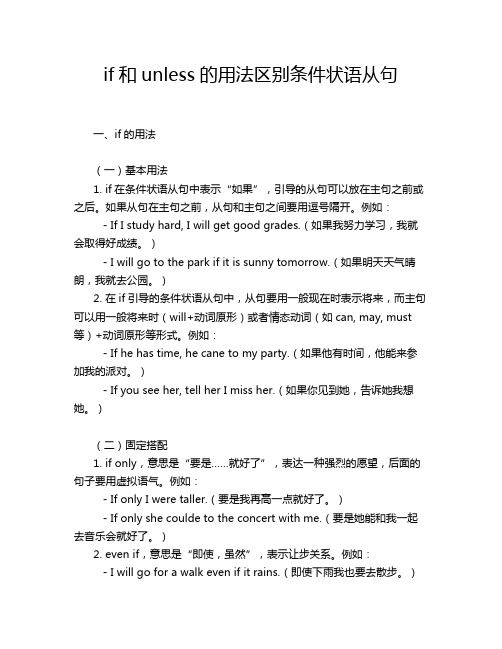
if和unless的用法区别条件状语从句一、if的用法(一)基本用法1. if在条件状语从句中表示“如果”,引导的从句可以放在主句之前或之后。
如果从句在主句之前,从句和主句之间要用逗号隔开。
例如: - If I study hard, I will get good grades.(如果我努力学习,我就会取得好成绩。
)- I will go to the park if it is sunny tomorrow.(如果明天天气晴朗,我就去公园。
)2. 在if引导的条件状语从句中,从句要用一般现在时表示将来,而主句可以用一般将来时(will+动词原形)或者情态动词(如can, may, must 等)+动词原形等形式。
例如:- If he has time, he cane to my party.(如果他有时间,他能来参加我的派对。
)- If you see her, tell her I miss her.(如果你见到她,告诉她我想她。
)(二)固定搭配1. if only,意思是“要是……就好了”,表达一种强烈的愿望,后面的句子要用虚拟语气。
例如:- If only I were taller.(要是我再高一点就好了。
)- If only she coulde to the concert with me.(要是她能和我一起去音乐会就好了。
)2. even if,意思是“即使,虽然”,表示让步关系。
例如:- I will go for a walk even if it rains.(即使下雨我也要去散步。
)- Even if he doesn't like me, I still want to be his friend.(即使他不喜欢我,我仍然想成为他的朋友。
)(三)双语例句1. If you love someone, should you tell them?(如果你爱一个人,你应该告诉他们吗?)2. If we don't protect the environment, where will we live in the future?(如果我们不保护环境,我们将来住在哪里呢?)3. If the cat gets out of the house, it might get lost.(如果猫跑出房子,它可能会迷路。
- 1、下载文档前请自行甄别文档内容的完整性,平台不提供额外的编辑、内容补充、找答案等附加服务。
- 2、"仅部分预览"的文档,不可在线预览部分如存在完整性等问题,可反馈申请退款(可完整预览的文档不适用该条件!)。
- 3、如文档侵犯您的权益,请联系客服反馈,我们会尽快为您处理(人工客服工作时间:9:00-18:30)。
What will I do if it is sunny this weekend?
Part1:If 的用法
1.I want to know if he will go to park with us. 宾语从句 2. We will have a picnic if it doesn’t rain.
3. He wondered ______ to stay here the next week.
与to do 不定式连用只能用whether 4. ____ he will come is not decided.
作主语只能用whether
If 引导条件状语从句
Complete the sentences with the correct form of the words.
If I’m late, _I _w_i_ll__s_a_y_rrow, I_w_i_l_l _w_a_t_c_h__T_V__a_t_h__o_m__e. I won’t__p_la__y_b_a__s_k_e_t_b_a_ll_.
If it _d_o_e_s__n_’t__ra_i_n__ tomorrow,
3. If you boil water, it becomes steam.
4. If you feel tired, you must have a rest. 条件状语从句
语法1:if作为宾语从句 的引导词,引导宾语从 句。(是否)
语法2:if(如果)引 导的条件状语从句
❀ if 用于宾语从句中
当句末为or not时,引导词只能用whether而不能用if.
If 与whether 的区别
1. I don’t know _____ he will come or not. 与or not 连用只能用whether
2. I don’t care of ______ he is handsome. 介词后只能用whether
play computer games
if条件状语从句(2)
句子特点: 1.if从句中用一般现在时,表示未来的一种条件, 从句中可以加时间状语。 2.当if表示未来的条件时,主句中用一般将来时。 句型结构: 主句+if条件状语从句 if条件状语从句,+主句(从句后加逗号)
原句式 引导词 从句语序
一般 whether 改为陈述句
疑问句 /if
语序
由从属连词whether, if 引导的宾语从句
e.g. 1. I want to know _i_f_(_w_h_e_t_h_e_r_) _h_e_w__il_l_g_o_t_o__th_e__p_a_r_k_w__it_h_.us
Look and say
If I’m hungry,
I will_e_a_t_s_o_m__e__fo_o_d__.
If I’m tired,
I will__h_a_v_e_a__r_e_s_t __.
Look and say
If I’m ill, _I_w_i_l_l _s_e_e__a_d_o__c_to__r_.
(他是否跟我们一起去公园)
2. Ask him _w_h_e_t_h_e_r_(_i_f)_h__e_c_a_n_c_o_m__e. (他是否能来) 3. I didn’t know _w_h_e_t_h_e_r_i_t_w_a_s__g_o_in_g__t_o_r_a_i_n_o_r_n.(ot是否要下雨)
_I’_ll_p_l_a_y_b_a_s_k_e_t_b_a_ll_.
If it is sunny this weekend, what will you do ?
If it is sunny this weekend, I __w_i_ll_p_l_a_y__ football with my classmates.
If it is sunny this weekend, I__________.
If it is sunny this weekend, what won’t you do ?
If it is sunny this weekend, I _W__o_n_’_t _s_ta_y__a_t_h_o_m__e____.
1.If you __li_s_te_n__(listen) to the music, _b_u_y__ (buy) a CD.
2. If he___is___ (be) late for school,d_o_n_’t_w__ait
(not wait ) for him.
3. If you _b_u_y_ (buy) a new camera, __g_et_ (get)
If it is sunny this weekend, I _w__o_n_’_t _w_a_t_c_h_t_e_le_v_i_s_io_n__.
practice
If you are free this weekend, what will you do ?
sleep
If I am free ,… watch TV
a good one.
4. If the light _d_o_e_s_n_’t__co_m__e_ (not come) on, _w__a_it (wait) for one minute.
If 条件状语从句(1)
句型结构
祈使句+if条件状语从句 if条件状语从句,+祈使句(从句后加逗号)
时态
if条件状语从句要用一般现在时。
What will you do if you’re happy?
❖ If I’m happy, I will _cl_a_p_m__y_h_a_n_d_s_. ❖ If I’m happy, I will _s_ta_m__p_m__y_f_e_e_t . ❖ If I’m happy, I will _n_o_d_m__y_h_e_a_d__. ❖ If I’m happy, I will __w_i_n_k_m__y__e_y_e_s_.
